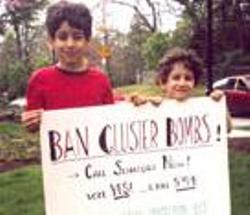|
|
Over 100 Countries Negotiate Cluster Bomb Ban
un article par Good News Agency
Year 9th, no. 7 - 16 May 2008
www.goodnewsagency.org
A global treaty banning cluster bombs that cause unacceptable harm to civilians will be finalized later this month during May 19-30 in Dublin, Ireland. The U.S. government won’t be there, despite the presence of more than half the world’s countries and all major NATO allies (United Kingdom, Germany, France, etc.).

Image from website of US Campaign to Ban Landmines
The treaty process has moved rapidly from conception to near completion in just over a year, while going largely unnoticed in the U.S. It started in February 2007 when 46 governments met in Oslo to endorse a call by the Norwegian government to conclude a new legally binding treaty in 2008 to prohibit the use, production, transfer and stockpiling of cluster munitions that cause unacceptable harm to civilians and to provide adequate resources to assist survivors and clear contaminated areas. Subsequent “Oslo Process” meetings were held in Peru, Austria, and New Zealand to develop a draft treaty text. The meeting in Dublin will be the actual treaty negotiation and adoption of the final text.
For further information, see the website of the US Campaign to Ban Landmines.
|








|
DISCUSSION
Question(s) liée(s) à cet article:
Can cluster bombs be abolished,
* * * * *
Commentaire le plus récent:
Here are more recent news on the cluster bombs treaty, as taken from Agence France Presse (very little coverage in the US media, as usual for peace matters).
..........................
Observers laud landmark cluster bomb ban
May 28, 2008
DUBLIN (AFP). — Observers on Thursday lauded a landmark treaty agreed by delegates from 111 countries in Dublin to ban cluster bombs, though the deal lacks the backing of major producers and stockpilers.
After 10 days of painstaking negotiations at Croke Park stadium in Dublin, diplomats agreed the wording of a wide-ranging pact to outlaw the use, production, transfer and stockpiling of cluster munitions by its signatories.
It also provides for the welfare of victims and the clearing of areas contaminated by unexploded cluster bombs.
The agreement will be formally adopted on Friday, and signed in Oslo on December 2-3. Signatories would then need to ratify it.
It was hailed in The Independent newspaper in London as a "significant step forward", describing cluster bombs as "little more than air-delivered landmines" and declaring that "there can be no compromise when it comes to cluster bombs."
The newspaper acknowledged in its editorial, however, that the document was weakened by the absence of the United States, Russia, China, India, Israel and Pakistan from the Dublin talks, and thus the agreement.
Irish Foreign Minister Micheal Martin said the treaty was a "very strong and ambitious text which nevertheless was able to win consensus among all delegations."
"It is a real contribution to international humanitarian law," he added.
The Irish Department for Foreign Affairs said 111 participating states and 18 observer countries attended.
The treaty requires the destruction of stockpiled munitions within eight years -- though it leaves the door open for future, more precise generations of cluster munitions that pose less harm to civilians.
Britain was widely cited by campaigners as being at the forefront of a group of states seeking to water down the treaty.
But in a dramatic move Wednesday, Prime Minister Gordon Brown announced in London that Britain would withdraw all its cluster bombs from service in a bid to "break the log jam" in the Dublin talks.
The draft treaty agreed in Dublin read:
"Each state party undertakes never under any circumstances to:
"(a) Use cluster munitions;
"(b) Develop, produce, otherwise acquire, stockpile, retain or transfer to anyone, directly or indirectly, cluster munitions;
"© Assist, encourage or induce anyone to engage in any activity prohibited to a state party under this convention."
Much of the wrangling focused on what signatories could and could not do in joint operations with states still using cluster bombs.
The draft text said signatories "may engage in military cooperation and operations".
But the Cluster Munition Coalition, an umbrella group of non-governmental organisations, hopes that the treaty will stigmatise the use of cluster munitions -- as the similar Ottawa Treaty did for landmines -- and stop countries from helping others to use them.
CMC co-chair Simon Conway told AFP the treaty was a compromise but nonetheless "incredibly strong".
"We're going to end up with a strong treaty that prohibits every cluster bomb that's ever been used, with no transition periods, with strong obligations on clearance and particularly strong obligations on victim assistance," he said.
Hildegarde Vansintjan, advocacy officer for disability campaigners Handicap International, said the convention made states responsible for providing assistance to cluster bomb victims.
The treaty "would be a real step forward for the people suffering from cluster munitions all over the world," she told AFP.
The cluster munitions ban process, started by Norway in February 2007, took the same path as the 1997 Ottawa Treaty by going outside the United Nations to avoid vetoes and seal a swift pact.
Cluster munitions are among the weapons that pose the gravest dangers to civilians, especially in heavily bombed countries such as Laos, Vietnam and Afghanistan.
Dropped from planes or fired from artillery, they explode in mid-air, randomly scattering bomblets. Countries are seeking a ban due to the risk of civilians being killed or maimed by their indiscriminate, wide area effect.
They also pose a lasting threat to civilians as many bomblets fail to explode on impact.

|
|









